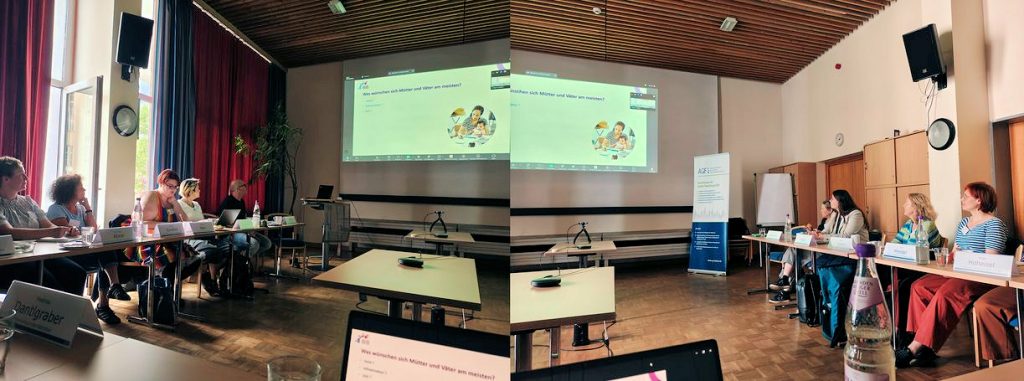„How is the rush hour of life changing and how do we deal with the challenges?”
At the AGF expert discussion on 10 July 2025, Prof. Dr Martin Bujard – President of the Protestant Working Group Family (eaf) and Research Director at the Federal Institute for Population Research (BiB) – presented the latest research findings on the so-called ‘rush hour of life’. This refers to the particularly intense phase of life in which many parents have to look after small children, are committed to their careers, maintain their relationships and at the same time have to think about their retirement provisions. The expert discussion was attended by representatives from family and welfare associations, academia, the Bundestag and the Federal Ministry for Family Affairs.
The slides from Prof. Dr Martin Bujard’s presentation can be downloaded here (german only): Presentation Bujard
The presentation was based on new evaluations of the FReDA study (‘Family Life in Germany’). These clearly show that many mothers, especially those with school-age children, would like to work more, but often encounter structural obstacles such as inadequate childcare facilities or rigid working time models. Fathers with young children, on the other hand, often express a desire to reduce their working hours. This desire is hindered not only by company policies, but also by traditional role models. This discrepancy leads to a significant imbalance in the amount of time spent on care and paid work between the sexes and can contribute to dissatisfaction, tensions in relationships and increased separation rates.
Prof. Bujard therefore advocated a policy aimed at greater time justice – through a redistribution of paid work and care work both between life phases and between the sexes. As a concrete policy response, he presented the eaf’s dynamic family working time model. It provides financial incentives for parents with young children if both partners work part-time close to full-time (for example, 25 to 35 hours per week each). The aim is to promote family-friendly employment models, reduce time conflicts and strengthen the equal sharing of family responsibilities. In the long term, the model also contributes to the better integration of mothers into the labour market and can help to secure skilled labour.
The subsequent discussion focused on the question of how to implement the insight that time, money and infrastructure must be considered complementary dimensions of family support. While financial relief for low-income families remains essential, reliable childcare services – in nurseries, schools and all-day programmes – remain a key concern for all families. At the same time, parents have a particularly strong desire for more time prosperity, above all to be able to cope with the double burden of work and care during the rush hour of life.
The expert discussion made it clear that modern family policy also needs modern time policy – one that is geared to the realities of family life and the time preferences of families, removes structural obstacles and provides tangible time relief during the rush hour of life.


